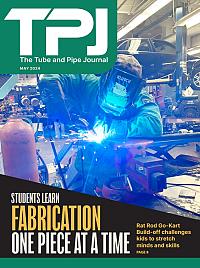- FMA
- The Fabricator
- FABTECH
- Canadian Metalworking
Categories
- Additive Manufacturing
- Aluminum Welding
- Arc Welding
- Assembly and Joining
- Automation and Robotics
- Bending and Forming
- Consumables
- Cutting and Weld Prep
- Electric Vehicles
- En Español
- Finishing
- Hydroforming
- Laser Cutting
- Laser Welding
- Machining
- Manufacturing Software
- Materials Handling
- Metals/Materials
- Oxyfuel Cutting
- Plasma Cutting
- Power Tools
- Punching and Other Holemaking
- Roll Forming
- Safety
- Sawing
- Shearing
- Shop Management
- Testing and Measuring
- Tube and Pipe Fabrication
- Tube and Pipe Production
- Waterjet Cutting
Industry Directory
Webcasts
Podcasts
FAB 40
Advertise
Subscribe
Account Login
Search
A new year and a new normal (and some old normal) for manufacturing
2021 will bring a new way of holding meetings and attending conventions
- By Eric Lundin
- February 2, 2021

Quite a bit of 2021 will be neither new nor normal. Coronaviruses aren’t new, vaccines aren’t new, keeping a distance from others isn’t new—but hopefully we’ll have a new way of holding meetings, seminars, conventions, and expos successfully so business can get back to normal, especially for the manufacturing industry and metalworking sectors. Getty Images
We’re about 12 months into the pandemic, and while 2020 was a disaster, various events are likely to make 2021 a much better year. It’s hard to say when we’ll see an end to the big impacts caused by COVID-19, but certainly some improvement is on the way.
The virus is still spreading, but the recent approval of two vaccines will help soon, as will warmer weather when spring arrives. By summertime we might have an entirely different environment, one with fewer business restrictions, more socializing, and so on. Many people throw around the phrase “new normal,” and that’s a good start, but in the grand scheme of things, quite a few things in 2021 will be normal.
Sure, having a vaccine for sudden acute respiratory syndrome-coronavirus-2 (SARS-CoV-2)is new as of late December, but inoculations have been used to prevent the spread of disease for nearly 1,000 years. The website of the Centers for Disease Control and Prevention lists 26 illnesses that can be prevented this way. Vaccines are nothing new. They’re normal.
Coronaviruses too are normal. They are known to cause the common cold, SARS-CoV (or simply SARS), and Middle East respiratory syndrome, formally known as MERS-CoV and often shortened to MERS. The common cold probably has been around since the dawn of time, spreads easily, but doesn’t wreak too much havoc. SARS spread for just two years and infected a small number of people, around 8,000. It is considered eradicated, but because it resides in animal hosts, it can make a comeback anytime. MERS never went far, infecting fewer than 2,500 people, but the mode of transmission remains a mystery and it hasn’t been banished. SARS-CoV-2 spreads like few other diseases, having infected 87 million in just 12 months or so. It has taken 1.87 million lives, so the fatality rate is right around 2%.
Prevention? Not new. Like the spread of the common cold and SARS-CoV, the spread of SARS-CoV-2 is best prevented by keeping a distance from those infected with it and avoiding high-touch surfaces. Frequent hand washing and the frequent use of hand sanitizer are additional prevention steps.
Our activities? This is where we’re likely to see trends that become a new normal. We’ll probably have to wear face coverings for some time, and maintaining a distance from others is likely to continue even after vaccinations have become commonplace.
It’s hard to say how many high-contact businesses will survive and recover. It’s inconceivable that we’ll have as many gyms, restaurants, airline flights, and hotels to choose from in the foreseeable future. It’s likely that such businesses that do survive will have to get by with fewer customers and lower profit margins, and therefore will have fewer offerings.
Meetings, conferences, conventions, and expos? We’re all waiting for progress in this area, aren’t we? The folks who run the expo center in Düsseldorf, Germany, ran a few expositions late in 2020 successfully, so we know it can be done. It’s likely that U.S. convention centers will start small in the spring or summer and work toward large events as time goes on.
FABTECH? It’s scheduled for Sept. 13-16 at McCormick Place in Chicago. The governor of Illinois and the mayor of Chicago aren’t especially verbose in forecasting any activities regarding the convention center, so it’s hard to say what’s going to develop and when. My guess is that they are keeping an eye on the happenings at the Las Vegas Convention Center. Employment in the tourism sector in Las Vegas is 2.71 times the national average, making it the most tourism-dependent city in the nation. In other words, Las Vegas has more to gain or lose than any other city and has a big stake in finding ways to carry out big events successfully.
subscribe now
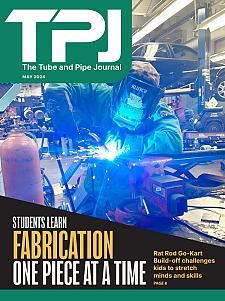
The Tube and Pipe Journal became the first magazine dedicated to serving the metal tube and pipe industry in 1990. Today, it remains the only North American publication devoted to this industry, and it has become the most trusted source of information for tube and pipe professionals.
start your free subscriptionAbout the Author

Eric Lundin
2135 Point Blvd
Elgin, IL 60123
815-227-8262
Eric Lundin worked on The Tube & Pipe Journal from 2000 to 2022.
About the Publication
- Stay connected from anywhere

Easily access valuable industry resources now with full access to the digital edition of The Fabricator.

Easily access valuable industry resources now with full access to the digital edition of The Welder.

Easily access valuable industry resources now with full access to the digital edition of The Tube and Pipe Journal.
- Podcasting
- Podcast:
- The Fabricator Podcast
- Published:
- 04/16/2024
- Running Time:
- 63:29
In this episode of The Fabricator Podcast, Caleb Chamberlain, co-founder and CEO of OSH Cut, discusses his company’s...
- Trending Articles
Zekelman Industries to invest $120 million in Arkansas expansion
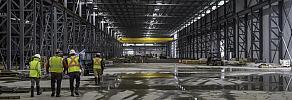
3D laser tube cutting system available in 3, 4, or 5 kW
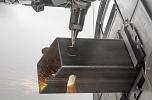
Corrosion-inhibiting coating can be peeled off after use
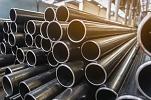
Brushless copper tubing cutter adjusts to ODs up to 2-1/8 in.

HGG Profiling Equipment names area sales manager

- Industry Events
16th Annual Safety Conference
- April 30 - May 1, 2024
- Elgin,
Pipe and Tube Conference
- May 21 - 22, 2024
- Omaha, NE
World-Class Roll Forming Workshop
- June 5 - 6, 2024
- Louisville, KY
Advanced Laser Application Workshop
- June 25 - 27, 2024
- Novi, MI
























